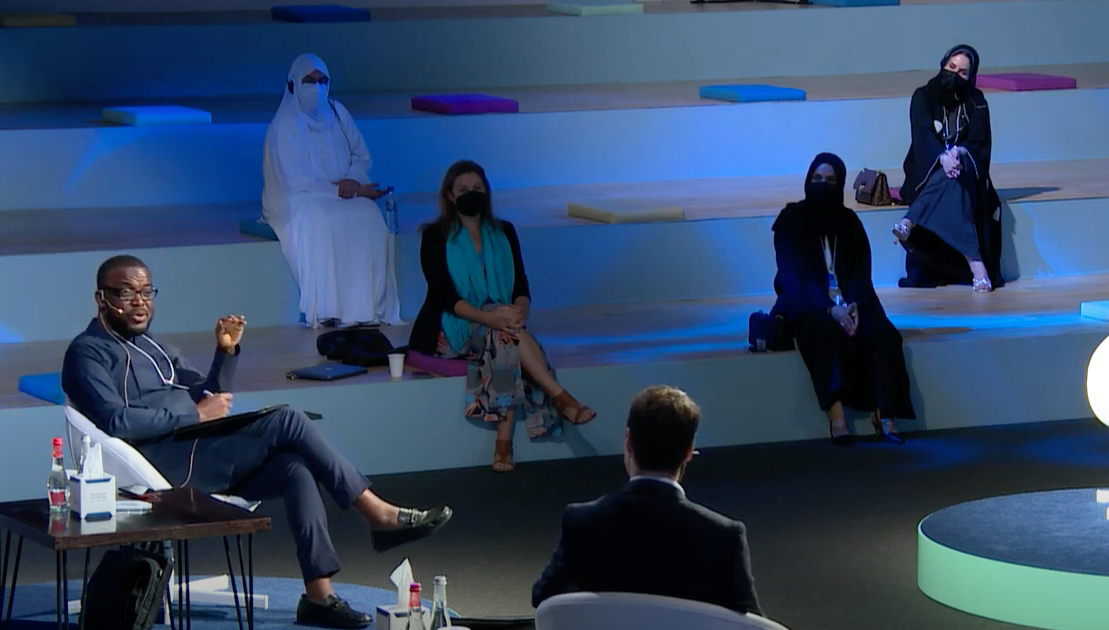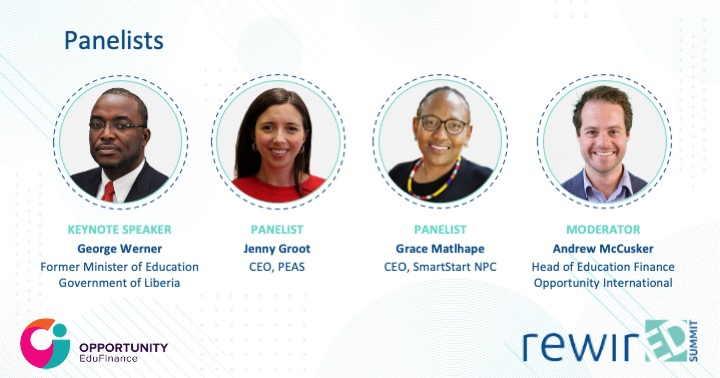RewirEd Summit 2021 – Financing Everybody’s Business

In December 2021, Opportunity EduFinance hosted a panel as part of the RewirEd Summit 2021 titled "Financing Everybody's Business" to align with one of the Summit's core messages that 'education is everybody's business.'
RewirEd is a global platform with a clear vision: to rewire education for a prosperous and sustainable future. Led by Dubai Cares, in partnership with Expo 2020 Dubai, the RewirEd Summit presented an opportunity for the global education community to come together to scale and jumpstart some of the positive change we want to see in education.
Over three days the summit included talks from world leaders and representatives for the UN, UNICEF, UNCHR, UNESCO, the World Economic Forum, the Global Partnership of Education and many more key global stakeholders in the future of education.
The Global Education Crisis
Andrew McCusker, Head of Opportunity EduFinance moderated this panel and introduced the challenge:
"Globally 264 million children are currently out of school, 61 million of these are primary school children, and 6 out of 10 kids aren’t learning. A further 353 million children that go to school don’t learn basic literacy and numeracy skills.
In every classroom, there are kids who should be sitting there but aren’t. There are also kids who are sitting in classrooms but who are receiving low-quality education. This panel was set up to discuss a range of operating models which are all working towards achieving UNESCO’s Social Development Goal 4 (SDG4).
Over the next five years we need to find the funds for 66 million school seats. There’s plenty of demand out there across the regions in which we work where we see a global education deficit, especially across Sub-Saharan Africa and South Asia. The challenge we have as an industry is to find operating models that can be used to invest in and to find financing models that work."

Keynote Speaker
George Werner, Former Education Minister of Liberia
“Let me set the picture for you. Africa is the youngest continent, 60% is under 25 and the median age is 19. This presents us with enormous potential but many complexities around it. The magnitude of the problem is such that it’s been estimated that it will cost around USD 175 billion to educate this cohort per year. When you multiply that per year and aim to do this by 2050 then you reach 5.7 trillion needed to educate these 720 million young Africans. Brookings research has said it will take 40 billion to close the gap every year.
Mastercard [Foundation] has said that by 2030, 108 million young Africans will be in high school. Within the context of SDGs for quality education and for skills and employment, they argue that we need partnerships for alternative, innovative and financing approaches.
I took over the education sector in Liberia when the shadow of Ebola was waning and then I realized that government has the primary responsibility to fund public education and there is nothing that private philanthropy can do to match what government does. What the private sector does is catalyzing – given the enormity of the problem, governments cannot do it alone. We need partnerships, so I set out to create a public/private partnership, bringing together non-state actors to help governments to run state schools and so doing to crowd the system with more financing and improve learning outcomes.
I believe strongly that this is the way forward, that governments cannot educate their citizens alone, that we need the private sector and blended funding. This is already happening. There are many thinking about development impact bonds, there are also social entrepreneurs working in primary schools and early childhood. There are also others modeling schools to help government improve systems.”

Panelists
We were joined by two pioneering organizations who have operating models working with non-state schools and who are using blended finance to educate many of the children in their markets.
Jenny Groot, CEO, PEAS
“The journey is to find an operating model that is investable and the way we can bring blended finance into this sector to support more children in the markets in which you work. PEAS was founded in 2008 and works in Zambia and Uganda running secondary schools and working with governments to support state secondary schools. We started by filling an access gap which is a challenge for both governments, with a huge number of children currently out of school.
In Uganda, the median age is 15 which presents a huge challenge for those both entering and leaving primary. In Zambia primary education is achieved with some quality issues whereas only 1 in 3 are in secondary education. PEAS mission was to expand access for those being left behind and focus on remote rural areas and keep fees low to maximize access. Over time our government partnerships have evolved.
In Zambia, we also now access government funding so that our schools are free to attend. This increases our ability to reach the most marginalized students, we now have 32 schools and are educating 15,000 young people. We are building evidence for our model and making sure our schools are delivering a better-quality education at a lower cost. We are open about our model to others who want to learn from it, and we focus on girls’ education and want to make sure others are prioritizing girls particularly in rural settings. We take our schools and share what works in them with the government systems. We bring in philanthropic funding, grants, and some loans. We know that a growing school is more likely to cover its costs each year. We bring in finance for construction and demonstrate that this is well spent on a financially sustainable secondary school.
Grace Matlhape, CEO, SmartStart, joined us for the panel but unfortunately, technical sound issues meant we were not able to hear directly from Grace. Learn more about the SmartStart Social Franchise model here.
Andrew McCusker, Head of EduFinance, Opportunity International
"We work to link low-cost affordable private schools with financing to build classrooms, washrooms, dormitories and to purchase equipment such as school buses. We are trying to find ways to bring in local banks and microfinance institutions. We have worked with local lenders who have invested in about 30,000 schools across 27 countries. We have found that this can be quite successful to bring in private investment capital to close this financing deficit. This particularly exists in Sub-Saharan Africa and South Asia.
More needs to be done. We need more grant funding to catalyze more private investment over time and as we build out these operating and financing models to have more of this investment capital flowing into the sector."
Panel Questions
What are the challenges?
Jenny: "One aim we have is how we support governments to be better spenders and to get better student outcomes with their own budget. There is a reluctance to spend on infrastructure in Sub-Saharan Africa because of projects in the past. We emphasize that we focus on financial sustainability to create a school network that is fully owned by the teams in Uganda and Zambia. It’s difficult to convince people that they are giving to a permanent structure where the local communities will feel full ownership.
A big challenge for us is how households will afford the school fees. We keep our fees lower than other schools but it’s going to be difficult especially with Covid-19."
Andrew: "In the history of EduFinance we have had about 60% of funding go straight to schools which allows them to upgrade their facilities and there is a payback which then allows them to enroll more children into the schools."
What do we need to attract more financing and get more kids into schools?
George: "We have to really engage governments and make sure they prioritize financing education with effective solutions. Mindset change is important – I found that with infrastructure included the donors thought the cost was too high, so I had to take it out. In many villages, the school building is the most important thing and you have to find a balance between the cost of building and the cost of improving quality. We have to really engage communities, community ownership and engagement are very critical to improving quality."
Calls to action:
- There is a need for more financing in the sector.
- There are many opportunities in Sub-Saharan Africa and elsewhere.
- There is a need for more incremental funding, grant investment and household funding.
The full recording of the panel discussion is available here.